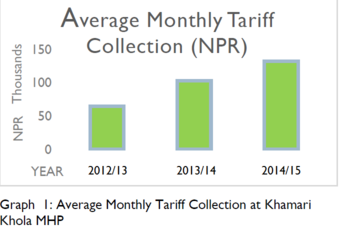Making Difference : Ensuring Sustainability
Overview
Case Study on Productive Use of Energy - Nepal
Nepal has successfully established many community micro hydropower projects (MHPs). This is being possible through strong community ownership from planning and decision making to equitable benefit sharing. However, community electrification schemes, focused narrowly on installation of technology, households’ connection and driven by supply side rather than ensuring the productive use of energy. The passive approach implicitly expects MHPs to stimulate productive activities in jurisdiction and waiting for spontaneous positive effect of electrification to trickle down. Yet off-grid electrification has largely failed to achieve any lasting impact on people’s livelihoods in far-flung communities. To reap the full benefits and generate adequate revenue base to cover Operation & Maintenance of such schemes, building energy literacy at demand side is paramount for the community. This will articulate their needs and supportive in enhancing the livelihood and sustainability of MHPs via increasing the revenue through maximum use of electricity generated in productive sectors.
Making a Difference: Ensuring Sustainability via Involvement of Productive Use of Energy in Micro Hydropower Plant
Productive Energy Use Component (PEUC) has been envisioned as one of the major component of National Rural and Renewable Energy Programme (NRREP) under Alternative Energy Promotion Center (AEPC) with an aim to initiate integrated approaches and strategy through nexus between energy and enterprises promotion. PEUC support to energize rural households and kick-start economic activities in catchment areas.
Khamari Khola MHP located north-west of Surkhet at Babiyachaur is widely regarded as the epitome of PEUC support intervention. The village of Babiyachaur is not only electrified by 53 kW it gets from the plant but it also thrives with bustling micro, small and medium-sized enterprises (MSMEs). This has improved the economic as well as social development and for an improved quality of life through opening new employment opportunities and increase income. In the recent year, the project shows a significant rise in consumption and equivalent collection of revenue thereby increasing the load factor of the plant.
It indicates effective management and sustainability of the project. Capitalizing on the steady stream of reliable electricity, local entrepreneurs have started all sort of business activities. 25 MSMEs have been supported through PEUC that have been effectively making a big difference in the life of many people and addressing the needs of the villagers. The catchment area has a grill industry, a dairy enterprise, auto-workshop, agro-processing mills and all other many sorts of enterprises, providing services, reducing physical drudgery, stimulating rural economic growth and decreasing emission footprint.
One of the supported enterprises Jaya Ganesh Grill Udhyog owned and operated by entrepreneur Mr Nagendra Shahi, states that the business has a high future prospect. The enterprise helps in creating employment opportunities for 6 people including two mechanics and two helpers. He and his wife are also engaged in the operation and management of the enterprise. After paying all expenses including energy tariff, he still manages to save NPR 40,000-42,000 per month. The entrepreneur highlighted the changes have been felt and possible in their rural villages due to the constant support and business counselling through PEUC.
Better access to energy leads to better development outcomes if a supportive enabling environment and regular business development supports are provisioned. Energy and productive use should not think in isolation and is a fundamental tenet for the long-term sustainability of renewable energy technologies.
Further Reading
- http://www.aepc.gov.np/docs/resource/resgfm/20151229010712_Combined English MSMEs Guidelines_opt.pdf
- Subsidy Policy 2016 (2073 BS)_Unofficial Translation_English.pdf http://www.aepc.gov.np/docs/resource/rescenter/20160606165013_RE Subsidy Policy 2016 (2073 BS)_Unofficial Translation_English.pdf
- Subsidy Delivery Mechanism 2013 in English.pdf http://www.aepc.gov.np/docs/resource/rescenter/20140317015050_RE Subsidy Delivery Mechanism 2013 in English.pdf
References
1. www.aepc.gov.np
3. Khamari Khiola MHP, Surkhet




















